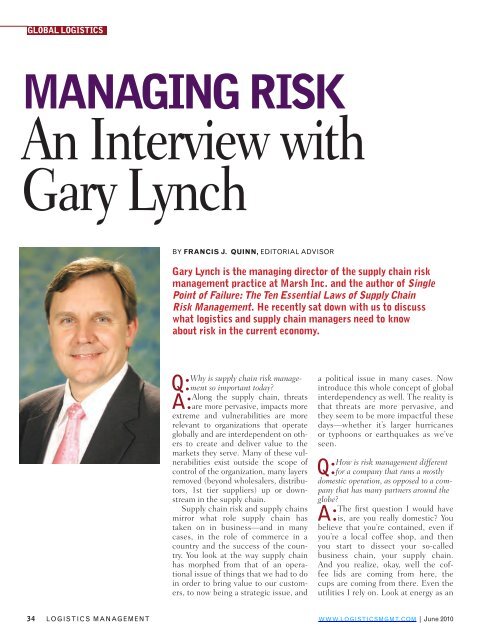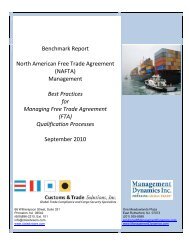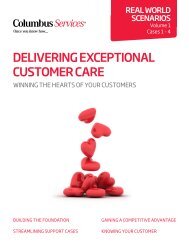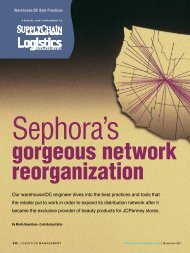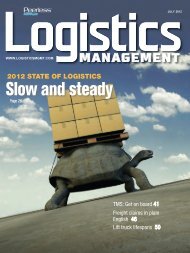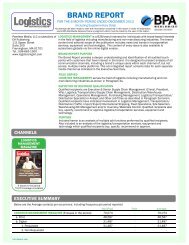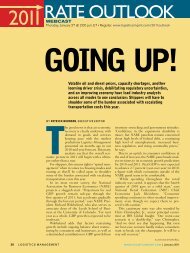Logistics Management - June 2010
Logistics Management - June 2010
Logistics Management - June 2010
Create successful ePaper yourself
Turn your PDF publications into a flip-book with our unique Google optimized e-Paper software.
globAL loGIsTICs<br />
MANAGING Risk<br />
An Interview with<br />
Gary Lynch<br />
BY francis j. quinn, editorial advisor<br />
Gary Lynch is the managing director of the supply chain risk<br />
management practice at Marsh Inc. and the author of Single<br />
Point of Failure: The Ten Essential Laws of Supply Chain<br />
Risk <strong>Management</strong>. He recently sat down with us to discuss<br />
what logistics and supply chain managers need to know<br />
about risk in the current economy.<br />
Why is supply chain risk management<br />
so important today Q:<br />
Along the supply chain, threats<br />
A: are more pervasive, impacts more<br />
extreme and vulnerabilities are more<br />
relevant to organizations that operate<br />
globally and are interdependent on others<br />
to create and deliver value to the<br />
markets they serve. Many of these vulnerabilities<br />
exist outside the scope of<br />
control of the organization, many layers<br />
removed (beyond wholesalers, distributors,<br />
1st tier suppliers) up or downstream<br />
in the supply chain.<br />
Supply chain risk and supply chains<br />
mirror what role supply chain has<br />
taken on in business—and in many<br />
cases, in the role of commerce in a<br />
country and the success of the country.<br />
You look at the way supply chain<br />
has morphed from that of an operational<br />
issue of things that we had to do<br />
in order to bring value to our customers,<br />
to now being a strategic issue, and<br />
a political issue in many cases. Now<br />
introduce this whole concept of global<br />
interdependency as well. The reality is<br />
that threats are more pervasive, and<br />
they seem to be more impactful these<br />
days—whether it’s larger hurricanes<br />
or typhoons or earthquakes as we’ve<br />
seen.<br />
How is risk management different<br />
Q: for a company that runs a mostly<br />
domestic operation, as opposed to a company<br />
that has many partners around the<br />
globe<br />
The first question I would have<br />
A: is, are you really domestic You<br />
believe that you’re contained, even if<br />
you’re a local coffee shop, and then<br />
you start to dissect your so-called<br />
business chain, your supply chain.<br />
And you realize, okay, well the coffee<br />
lids are coming from here, the<br />
cups are coming from there. Even the<br />
utilities I rely on. Look at energy as an<br />
34 <strong>Logistics</strong> <strong>Management</strong> WWW.LOGISTICSMGMT.COM | <strong>June</strong> <strong>2010</strong>


